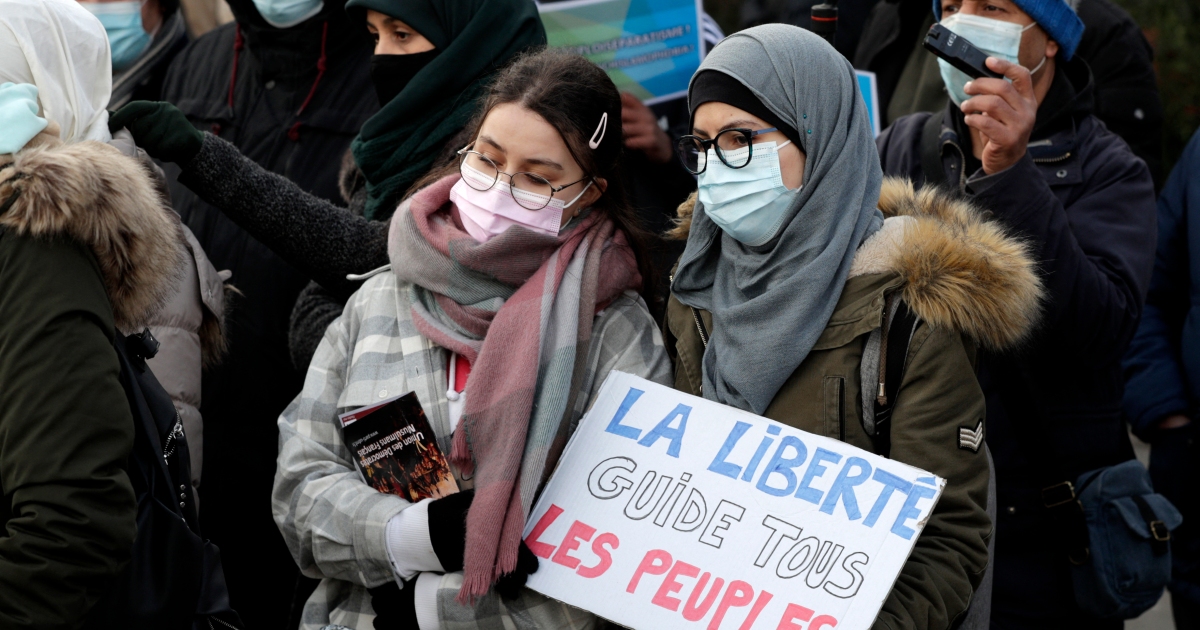
With another runoff between Macron and Le Pen looming, France’s obsession with Islam continues to disenfranchise voters and undermine the true separation of church and state.
Emmanuel Macron may have won the first round of France’s presidential election, but the success of right-wing candidate Marine Le Pen, who came in second with 23.1 percent of the vote, paints a worrying picture of the future of French politics.
Le Pen’s surge was in part due to her ability to focus on the cost of living and repaint herself as a moderate nationalist. But anti-immigrant and anti-Islamic attitudes, often wrapped up as a defence of “French culture”, remain a bulwark of her appeal.
Le Pen’s popularity demonstrates that divisive rhetoric holds political currency in France. Yet it is no longer solely the preserve of the far right. This year’s presidential election saw candidates from across the political spectrum attempt to outdo each other as defenders of “laïcité” (separation of church and state). At one point in 2021, Macron’s interior minister Gérald Darmanin even accused Le Pen of going “soft” on Islam.
France’s obsession with Islam is based on the concept that the state is secular in nature. Yet every political statement or government policy that seeks to protect laïcité and regulate Islam contradictorily entangles state and religion ever closer. Not only does this undermine any true division between religious and political spheres, but hinders genuine political dialogue over France’s rich cultural and religious tapestry.
An obsession with ‘political’ Islam
Attacks on Islamic “values” became an acceptable mainstay of political discourse under President Sarkozy, who frequently framed his anti-Muslim policies as a defence of laïcité. After the murder of Samuel Paty by an ISIL sympathiser, Macron has adopted a similar tenor, launched a crackdown on Muslim civil society organisations, and undermined academic freedom by commissioning a study on the alleged expansion of Islamo-leftist (Islamo-Gauchiste) ideology at French universities.
While Macron’s efforts to curb religious “extremism” may seem rational, they also evoke an uncomfortable truth as to who truly counts as fully French and what can be considered a proper interpretation of French society. As Reza Zia-Ebrahimi writes, laïcité is not a fixed set of values, and its lurch towards a right-wing anti-Islamism has occurred incrementally over several decades.
Yet it is law-abiding Muslims that have often felt the real-life consequences. The recent anti-separatism bill against Islamist “extremism” gives French authorities greater power to intervene in religious associations and limits foreign funding. Over the past year, there have been a number of cases where French authorities have used administrative procedures to close down mosques, schools, Muslim food stands and even a leading anti-discrimination group, the Collective Against Islamophobia in France.
A ‘culture war’ by any other name
Macron has denied France is in the throes of a US or UK-style “culture war”, but the language of laïcité denotes an anxiety about cultural loss and anti-immigrant sentiment that the European right has been exploiting for decades. Islamophobia is sadly commonplace across Europe and the US, but whereas Islamophobia is recognised (albeit sometimes disingenuously) by political leaders in most Western countries, French politicians refute the very existence of any anti-Muslim stigma. Instead, “Islamophobia” is seen as a ploy by an “Islamo-leftist” front to silence defenders of French culture.
This double-denial silences debate over France’s rich cultural and religious heterogeneity. Instead, uniformity is considered the basis of belonging, with little attention paid to the power and backgrounds of who gets to delineate the ethical contours of such an identity. As Muslim migrants are not recognised along ethnic lines, discrimination against Muslims is understood as religious critique rather than cultural disenfranchisement. Such criticism is defended as a legitimate expression of free speech in a secular society, and those who voice unease with the nature of such critique are either labelled as leftist Islamic sympathisers or outright Islamists.
This leaves little space for French Muslims – whether they practice Islam or not – to genuinely contribute to political debates on their terms. Muslim French citizens – despite many being second or third-generation sons and daughters of immigrants – are disenfranchised through simultaneous demands that they assimilate while excluding them through spatial, legal, and security measures. The broader intersectionality of contemporary French identity is ignored as a threat to the privileged position of traditional culture.
Reclaiming laïcité?
Sadly, with the final presidential runoff between Macron and Le Pen only weeks away, there is little prospect that anti-Islamic political feeling will dissipate anytime soon. It is seen as an easy vote-winner, and neither candidate will be willing to dent their “cultural” credentials.
But, in the long term, any genuine effort to end France’s sensationalist obsession with Islam will require recognition of the diversity amongst the country’s six million Muslim citizens and the creation of genuinely open spaces within which religion can be discussed without state interference. Only by doing so can the ideal of laïcité be reclaimed from its current right-wing interpretation and lead to true free debate.
The views expressed in this article are the author’s own and do not necessarily reflect Al Jazeera’s editorial stance.







